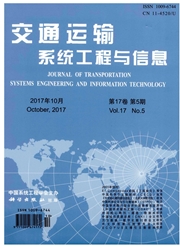

 中文摘要:
中文摘要:
综合运输效率高低是衡量运输结构是否合理、方式间是否协调的重要依据.引入SBM-undesirable模型,基于时序演变,系统分析了1979~2012年中国的综合运输效率,并对投入产出要素作定量调整.结果表明,非期望产出对综合运输效率具有显著负影响;1979~2012年中国的综合运输效率呈"凹"字形波动,均值为0.68,其中1999年效率值最低,不及均值一半;从分解效率看,综合运输效率同时受纯技术效率与规模效率的双重影响,且纯技术效率的制约力略强于规模效率,整体呈"综合效率≤纯技术效率≤规模效率";运输从业人员、铁路机车拥有量及死亡人数是影响综合运输效率的前三个重要因素.因此,调整运输资源结构、减少非期望产出和提高技术效率是提升综合运输效率的现实途径.
 英文摘要:
英文摘要:
Integrated transportation efficiency is an important index for evaluating transport structure and coordination state. This paper gives a systematic analysis on integrated transportation efficiency in China from 1979 to 2012 based on the temporal evolution by introducing SBM- undesirable. A quantitative adjustment is made on i-o elements. Results show that: Undesirable output has a significant negative impact on transport efficiency; Integrated efficiency from 1979 to 2012 is concave- shape fluctuation, wherein the average value is 0.68 and the lowest efficiency in 1999 is less than half the average; From the decomposition efficiency perspective, integrated efficiency is affected by pure technical efficiency and scale efficiency simultaneously, where constraints force of pure technical efficiency is stronger, i.e., "overall efficiency ≤pure technical efficiency ≤scale efficiency"; Transport staffs, locomotive ownership and death toll are the three main factors affecting transport efficiency. Therefore, adjusting transport resource structure, reducing undesirable output and improving technical efficiency is the realistic path to improve transport efficiency.
 同期刊论文项目
同期刊论文项目
 同项目期刊论文
同项目期刊论文
 期刊信息
期刊信息
